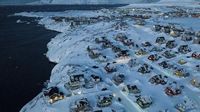On March 28, 2025, U.S. Vice President JD Vance and his wife, Usha Vance, embarked on a highly controversial visit to Greenland, a semi-autonomous Danish territory, amid rising tensions and local opposition. Initially planned as a three-day trip to engage with local culture and communities, the itinerary was drastically reduced to a one-day visit to the U.S. Space Force base at Pituffik, located in northwestern Greenland. This change came after significant backlash from Greenlandic and Danish officials, who expressed their discontent over the perceived lack of consultation regarding the visit.
The visit coincides with a pivotal moment in Greenlandic politics, as four of the five parties elected to the Greenlandic Parliament earlier this month have agreed to form a coalition government aimed at resisting U.S. pressures regarding the territory. Jens-Frederik Nielsen, leader of the Demokraatit party and the largest party in parliament, emphasized the urgency of this coalition, stating that it is vital to counter the growing influence of the U.S. under President Donald Trump, who has repeatedly suggested that the United States should control Greenland for its strategic and resource-rich value.
Greenland's Prime Minister Múte Bourup Egede condemned the Vances' visit, labeling it as “very aggressive.” He remarked, “Until recently, we could safely rely on the Americans, who were our allies and friends, and with whom we liked to work closely. But that time is over.” Egede's comments reflect a growing sentiment among Greenlanders who feel that their autonomy is under threat as U.S. interest in the territory intensifies.
During the lead-up to the visit, U.S. officials reportedly conducted a door-to-door campaign in Nuuk, Greenland's capital, attempting to gauge local sentiment about the Vances’ arrival. However, the response was overwhelmingly negative, with many residents expressing their disinterest in engaging with the Second Lady. Danish television station TV2 reported that officials were told, "No, thank you," when seeking individuals willing to meet Usha Vance.
In light of the backlash, Danish Prime Minister Mette Frederiksen noted that the visit had created “unacceptable pressure,” and underscored that “Greenland belongs to the Greenlanders.” This sentiment was echoed by Lars Løkke Rasmussen, Denmark’s minister for foreign affairs, who stated that the visit was primarily about the Vice President visiting a U.S. military installation, and had “nothing to do with us.”
As the Vances prepared for their trip, President Trump reiterated his controversial stance on Greenland, declaring that the U.S. would “go as far as we have to go” to gain control of the island. His comments have drawn ire from both Greenlandic and Danish officials, with Danish Defence Minister Troels Lund Poulsen calling Trump's rhetoric “far out” and a “hidden threat.”
Russia's President Vladimir Putin also commented on the situation, stating that the U.S. interest in Greenland was not surprising given its historical context. He remarked, “It would be wrong to believe that this is some sort of extravagant talk by the current U.S. administration,” highlighting the longstanding U.S. aspirations for influence in the Arctic region.
Inhabitants of Nuuk have voiced their concerns about the visit and the implications of U.S. interest in their territory. Cora Høy, a 22-year-old resident, expressed her feelings, stating, “Vance is welcome if he wants to see it but of course Greenland is not for sale.” Fellow resident Inuk Kristensen added, “It’s all a bit crazy. Of course the population here is a bit shook up,” reflecting the anxiety surrounding the U.S. administration's intentions.
Initially, Usha Vance had planned to attend the Avannaata Qimussersu dogsled race, a significant cultural event in Greenland, but this aspect of the trip was scrapped amid growing tensions. The change to a visit focused solely on the military base was seen as an attempt to avoid potential protests and negative interactions with the local populace.
Many Greenlanders have expressed their desire for more business opportunities and partnerships with American companies, but they are firmly against any notion of a political takeover. As Martin Breum, a journalist specializing in Greenlandic affairs, noted, “It’s the idea of a (Trump) political takeover that they really object to.”
Despite the scaled-back visit, Vance maintained that the U.S. aims to “reinvigorate the security of the people of Greenland,” asserting that it is crucial for global security. However, this assertion has been met with skepticism by many who view the visit as a power play rather than a genuine effort to support Greenland.
As the Vances prepare to meet with U.S. service members at Pituffik, the implications of their visit continue to resonate throughout Greenland and Denmark. The growing fears of U.S. annexation and the desire for Greenlandic self-determination remain at the forefront of local and international discussions.
In summary, the Vances' visit to Greenland highlights the complex dynamics of international relations in the Arctic, where geopolitical interests, local autonomy, and historical grievances intersect. With the backdrop of Trump's controversial statements and the formation of a new Greenlandic coalition government, the future of U.S.-Greenland relations remains uncertain.








